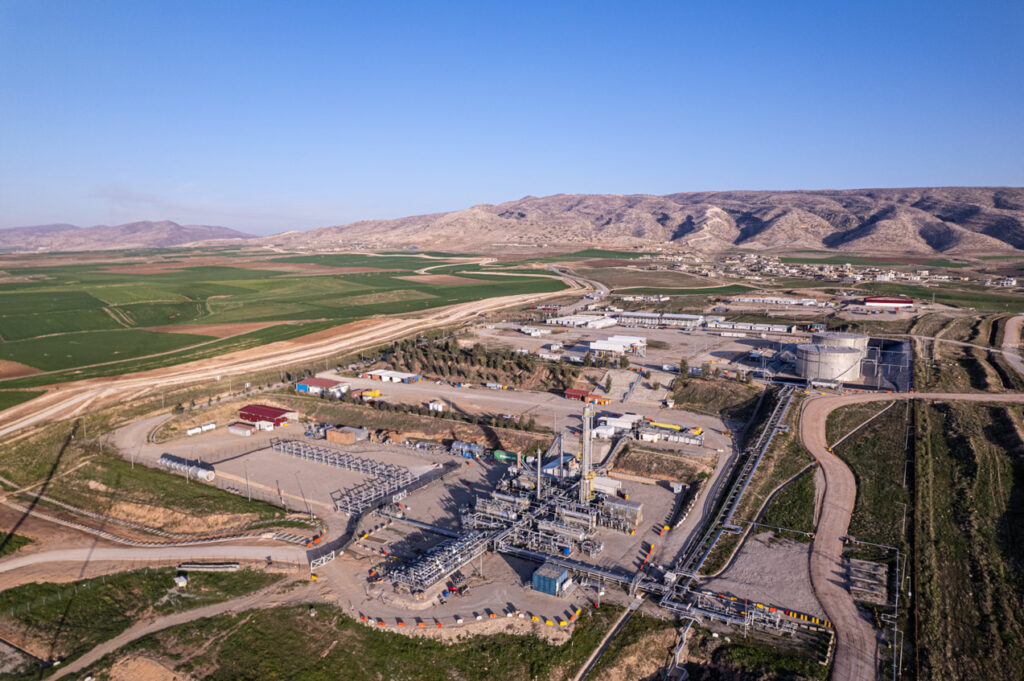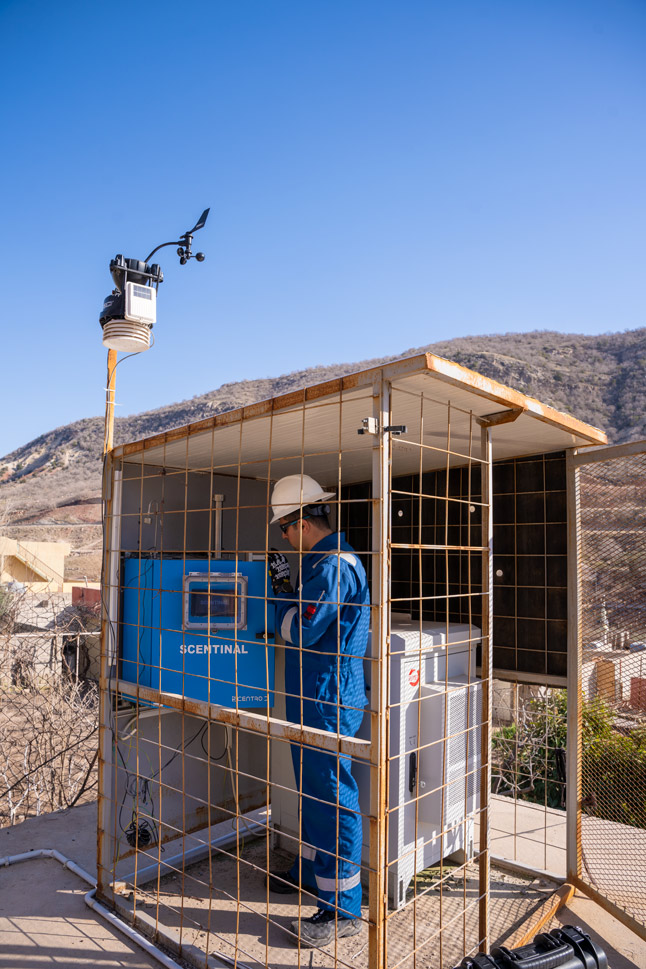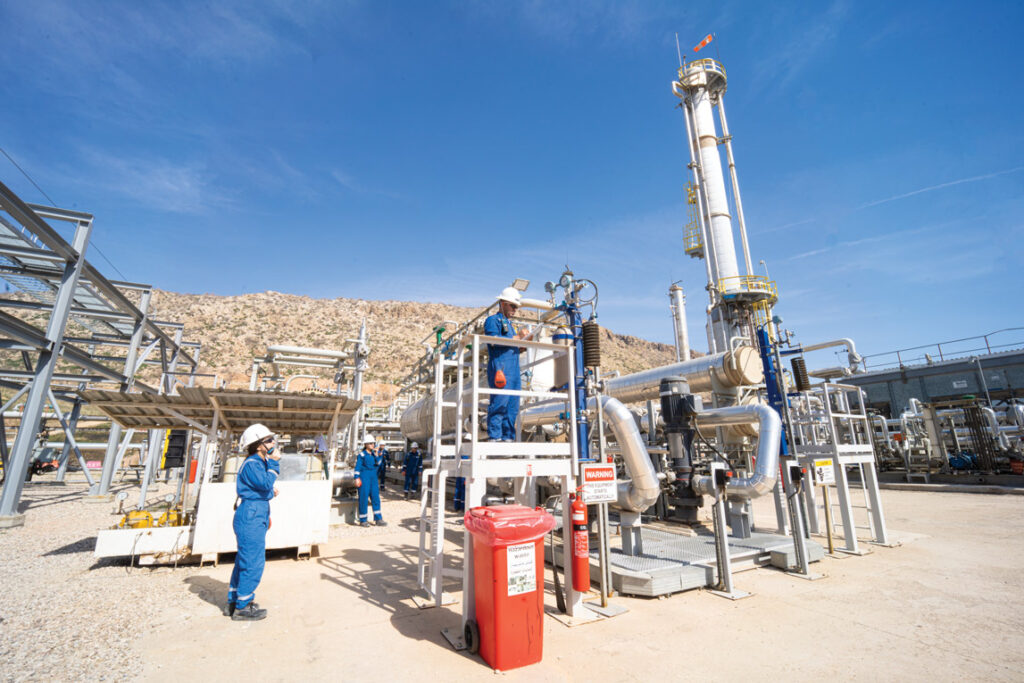This website uses cookies so that we can provide you with the best user experience possible. Cookie information is stored in your browser and performs functions such as recognising you when you return to our website and helping our team to understand which sections of the website you find most interesting and useful.

ESG
Environment
Our focus
We recognise the need to develop and produce from the Shaikan Field in a way that minimises our impact on the local environment and addresses climate‑related risks and opportunities. For GKP, this means monitoring our emissions footprint and taking steps to reduce the carbon intensity of our operational activities, maintaining compliance with TCFD recommendations for our reporting, protecting air quality around our operations and managing the impact of our facilities on the local environment.
Decarbonisation opportunities
It remains our ambition to significantly reduce our scope 1 emissions intensity to increase the sustainability of our operations, address climate-related risks and opportunities and maintain our licence to operate in Kurdistan. As part of the Shaikan Field Development Plan, we had been intending to implement a Gas Management Plan to eliminate almost all routine flaring. Subject to timely sanction and implementation of the project, including securing external financing, we were targeting to reduce our scope 1 emissions intensity by >50% by 2025, compared to an original 2020 baseline of 38 kgCO2e. In addition, we had also been exploring a number of other decarbonisation opportunities and progressing as a priority a project to eliminate methane emissions from our storage tanks in 2024.
Following the closure of the Iraq-Turkey Pipeline and suspension of Kurdistan exports on 25 March 2023, the Company moved swiftly to preserve liquidity, suspending all expansion activity, including investment in decarbonisation opportunities. A return to investment will require a resumption of exports and confidence in the commercial and payments environment. As it is not clear at the current time when this will be, the Company’s emissions reduction targets have been suspended.
We remain committed to significantly reducing our emissions and will review and reinstate our targets when we have more clarity on the outlook. In the meantime, we are in the early stages of exploring alternative options to the Gas Management Plan, with a focus on optimising scope, implementation timing and cost. We are also prioritising our list of additional decarbonisation opportunities so we are ready to progress at the appropriate time.

Consistency with Task Force on Climate-related Financial Disclosures recommendations
We recognise the need to develop and produce from the Shaikan Field in a way that minimises our impact on the local environment and addresses climate‑related risks and opportunities. GKP has taken significant steps in recent years to develop a sustainability strategy, with a focus on minimising the Company’s environmental footprint, while addressing climate-related risks and opportunities. 2020 represented GKP’s first disclosure to address the TCFD recommendations and since then the Company has focused its efforts on enhancing its disclosures, with the climate-related financial disclosures in the 2022 annual report fully compliant with TCFD’s recommended disclosures.
Gulf Keystone’s climate-related financial disclosures made in the 2023 annual report are fully compliant with all 11 of the TCFD’s recommended disclosures. Full compliance with TCFD demonstrates GKP’s commitment to addressing climate-related risks and opportunities, with the four pillars of TCFD embedded into our business and strategy.
Protecting air quality
We maintain a robust air quality monitoring programme to protect our local communities. We monitor air quality in a variety of ways, including stationary field monitoring, diffusion tubes, handheld Photo‑ionisation Detectors (“PIDs”) and gas surveys. Air quality data is reported to Kurdistan’s Ministry of Natural Resources on a monthly basis to ensure ongoing compliance. In 2023, our annual average emissions of SO2, NO2, O3 and H2S measured by diffusion tubes were within Kurdish regulatory limits.

Facility impact management
We undertake detailed facility impact management studies prior to commencing any site work. Before facilities or access roads are built, flowlines installed or wells drilled, GKP conducts a thorough environmental and social impact assessment (“ESIA”) as part of our project design phase.
Soil remediation
We aim to avoid any instances of contaminated soil, surface water and groundwater resulting from our operations to prevent any risks to public health and safety or our impact on the environment. As part of our standard procedure, all waste drilling cuttings and fluids are managed in line with Kurdistan legislation and international standards. We also ensure that any pits that are excavated next to well pads to hold drilling fluid are remediated after any drilling operations are completed.
Waste management
Gulf Keystone maintains high standards of waste management in the Shaikan Field and our offices. We sort our waste into four categories:
- liquid hazardous waste: includes waste crude oil, contaminated water and drilling fluids;
- liquid non-hazardous waste: includes uncontaminated water;
- solid hazardous waste: includes drilling cuttings, chemicals and medical waste; and
- solid non-hazardous waste: includes food waste, packaging, glass and metals.

Water management
With our operations situated in a region that is prone to drought, having a strong water and wastewater management process in place is a key consideration – not only for our own business but for our land and local communities.
The majority of our water use, measured as water withdrawn, is associated with our drilling activities. The remainder is used for operational requirements and as drinking water in our production facility camps. Water at the camps is supplied via water wells, which are analysed monthly and chlorinated weekly to ensure they meet World Health Organization (“WHO”) guidelines.
Wastewater management
Our sewage wastewater is continuously treated in sewage treatment units, with samples taken from the inlet and outlet streams to ensure the units are operating efficiently and that the quality of the effluent meets WHO guidelines.
Any wastewater from drilling activities with oil traces is collected and transported via vacuum trucks to an MNR-approved refinery that specialises in recycling oil and lubricants of different grades from waste containing oil and/or hydrocarbons.
